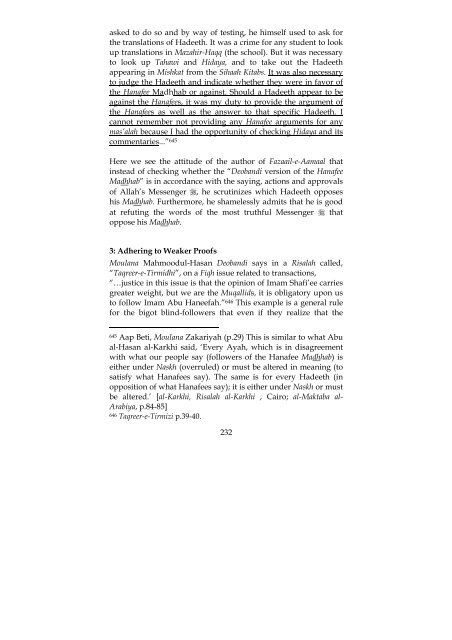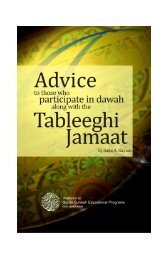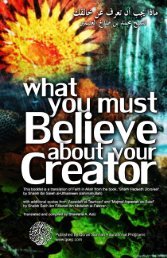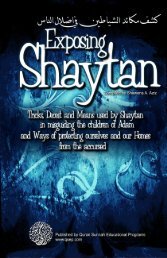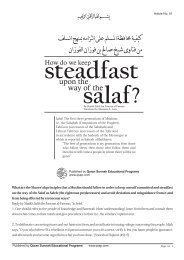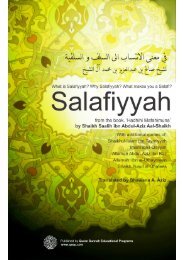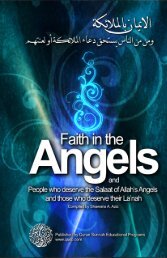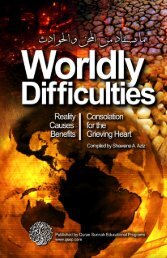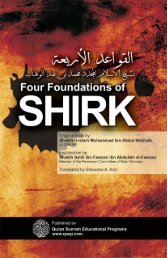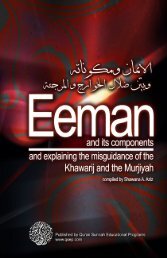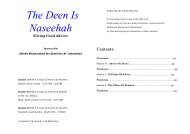- Page 1 and 2:
The JAMAAT TABLEEGH and the Deoband
- Page 3:
Acknowledgements I sincerely thank
- Page 6 and 7:
1. Tawheed ar-Ruboobiyyah: Belief i
- Page 8 and 9:
Deobandi View: (4) - The Messengers
- Page 10 and 11:
The Majzoob is useless even to Sufi
- Page 12 and 13:
Analyzing the Deobandi Claims and C
- Page 15 and 16:
Foreword Indeed, all praise is due
- Page 17:
As the discussion in this book will
- Page 21 and 22:
Bismillah ar-Rahmaan ar-Raheem Intr
- Page 23 and 24:
3. Innovations in Beliefs and Worsh
- Page 25 and 26:
Hadeeth shows the gravity of imitat
- Page 27:
would be worshiping Allah in the wa
- Page 31 and 32:
Chapter 1: Overview and Background
- Page 33 and 34:
(propagation) be mine, so that this
- Page 35 and 36:
The Training Manual of the Jamaat T
- Page 37 and 38:
described as a perfect Muslim” 42
- Page 39 and 40:
Vedantic schools. By that time, the
- Page 41 and 42:
morsel, his state began to change.
- Page 43 and 44:
starvation. He would break fast onl
- Page 45 and 46:
These abovementioned examples show
- Page 47 and 48:
The Importance of Aqeedah to the Su
- Page 49 and 50:
innovators) and Wahabi, live in pea
- Page 51:
others to other than my way, you wi
- Page 55 and 56:
Chapter 2: The Islamic Concept of T
- Page 57 and 58:
ing us closer to Allah.” 82 Calli
- Page 59 and 60:
The Essence of Shirk in Tawheed al-
- Page 61 and 62:
you all made it Halaal?” He repli
- Page 63:
Tawakkul in Him.” 107 “And put
- Page 67 and 68:
Chapter 3: Pantheism, Wahdat al-Waj
- Page 69 and 70:
a rapturous rhapsody that Hazrat Ha
- Page 71 and 72:
attendants of the circle of Abu Yaz
- Page 73 and 74:
creatures like dogs and pigs! 129 A
- Page 75 and 76:
The concept of ‘Allah being every
- Page 77 and 78:
2. Moulana Ashraf Ali Thanvi said,
- Page 79 and 80:
Comment: The Religion of Islam, as
- Page 81 and 82:
These remarks prove that the concep
- Page 83 and 84:
2. Abu Saeed al-Khudree reports th
- Page 85 and 86:
Imam Malik (d.179H): Abdullah Ibn N
- Page 87 and 88:
Imam Ibn Katheer (rahimahullah) wri
- Page 89 and 90:
This idea that every god whom men w
- Page 91:
The JAMAAT TABLEEGH and the Deoband
- Page 94 and 95:
Sufism, Grave-worship and Saint-wor
- Page 96 and 97:
people began to stay and confine at
- Page 98 and 99:
Narrated Anas , when the ailment of
- Page 100 and 101:
Deobandi masses and the cadre of th
- Page 102 and 103:
any human immortality before you (O
- Page 104 and 105:
3. As for the narration, “The Pro
- Page 106 and 107:
In light of this Hadeeth, we clearl
- Page 108 and 109:
4. “Once an old man came to Qari
- Page 110 and 111:
long as, he was among them. Allah s
- Page 112 and 113:
their long deep sleep) that they mi
- Page 114 and 115:
Refutation (1) The Angels Convey th
- Page 116 and 117:
“Had this woman let him to himsel
- Page 118 and 119:
Doubt (2): Kafirs in the well of Ba
- Page 120 and 121:
the night, I saw Rasoolullah and hi
- Page 122 and 123:
The attitude of the Sahabah toward
- Page 124 and 125:
After claiming that Allah’s Messe
- Page 127 and 128:
Chapter 5: Visiting Graves Shirk an
- Page 129 and 130:
graves as places of worship, for ve
- Page 131 and 132:
Moulana Zakariyah expresses his bel
- Page 133 and 134:
(b) Al-Medina is visited with the i
- Page 135:
The JAMAAT TABLEEGH and the Deoband
- Page 138 and 139:
Also, al-Qurtubi writes in his Tafs
- Page 140 and 141:
Observed Phenomenon The argument pu
- Page 142 and 143:
incident is related in the Qur’aa
- Page 145 and 146:
Chapter 7: Waseelah “Seek the mea
- Page 147 and 148:
Moulana Aashiq Ilahi Meerathi menti
- Page 149 and 150:
“Our Lord! Verily, we have heard
- Page 151 and 152:
Fazaail-e-Aamaal mentions a number
- Page 153 and 154:
The Deobandi’s Error in Understan
- Page 155 and 156:
So he ... “…then went to the gr
- Page 157 and 158:
Messenger of Allah. Beg the interce
- Page 159 and 160:
He (Mufti Abdur Rahim Lajpuri) says
- Page 161:
Conclusion In this chapter, we have
- Page 165 and 166:
Chapter 8: Worship in Islam Introdu
- Page 167 and 168:
as has been prescribed in the vario
- Page 169 and 170:
thighs in close proximity to the kn
- Page 171 and 172:
In the Fazaail-e-Aamaal, Moulana Za
- Page 173 and 174:
Sending Darood upon Allah’s Messe
- Page 175 and 176:
Moulana Zakariyah mentions, ‘Once
- Page 177 and 178:
The Majzoob Sometimes the insanity
- Page 179 and 180:
these stories are used as a source
- Page 181 and 182:
and supplicate to Him, and He Desce
- Page 183 and 184:
5. “The acts of virtue, the recti
- Page 185 and 186:
Even when the obligatory acts of wo
- Page 187:
The JAMAAT TABLEEGH and the Deoband
- Page 190 and 191:
Our Only Source to the Knowledge of
- Page 192 and 193:
Qiyaamah, Siraat, Hawdh-e-Kawthar,
- Page 194 and 195:
These quotes render meaningless the
- Page 196 and 197:
(iii) Dream interpretation is not p
- Page 198 and 199:
the people. On the occasion of the
- Page 200 and 201:
the other is Moulana Rasheed Ahmad,
- Page 202 and 203:
(ii) Rasheed Ahmad Gangohi says,
- Page 204 and 205:
5. The Belief that the Awliya after
- Page 206 and 207:
Umar then said: “By Allah, it was
- Page 208 and 209:
heart of someone who would possess
- Page 210 and 211:
Kashf Unlike dreams, in which a per
- Page 212 and 213:
what Allah will do with me.’ “U
- Page 214 and 215:
“One of my trusted friends narrat
- Page 216 and 217:
The hypocrites of Medina, the Quray
- Page 218 and 219:
disrespect to compare the ranks of
- Page 220 and 221:
Khidr said to him, “If what you s
- Page 222 and 223:
Sambhani, “(Moulana Ilyas) has be
- Page 224 and 225:
Abu Hurayrah who spent the most ti
- Page 226 and 227:
Even the Sahabah, who were close to
- Page 228 and 229: his death however, the guidance and
- Page 231: The JAMAAT TABLEEGH and the Deoband
- Page 234 and 235: When Allah ascended His Messenger
- Page 236 and 237: idea vehemently to the extent that
- Page 238 and 239: “If thou (Allah) had not created
- Page 240 and 241: Although, Allah’s Messenger is t
- Page 242 and 243: False Belief These Qasidas also pro
- Page 244 and 245: Conclusion Allah’s Messenger sho
- Page 247 and 248: Chapter 11: Blind Following of Sufi
- Page 249 and 250: to inquire, “How far is Delhi fro
- Page 251 and 252: whom the letter was addressed to (i
- Page 253 and 254: The Shaikh saves from the torment i
- Page 255 and 256: Tawheed al-Matlab as explained by R
- Page 257: Therefore, the scholars of Deoband
- Page 261 and 262: Chapter 12: The Deobandi’s Unders
- Page 263 and 264: As proof, they quote the verse, “
- Page 265 and 266: Hadeeth, which rules different from
- Page 267 and 268: Eemaan (p.72-74), “Trifling there
- Page 269 and 270: this way. He prohibited something f
- Page 271 and 272: way for the scholars and the common
- Page 273 and 274: 3. The Deobandis forced to follow t
- Page 275 and 276: (1) The Qur’aan and the Sunnah pr
- Page 277: “Every statement on the authority
- Page 281 and 282: 5: Extremism in defending the Imam:
- Page 283 and 284: The Ruling on Taqleed is dependant
- Page 285 and 286: Deobandis upon their views on, ‘K
- Page 287 and 288: Allah’s Messenger and neither do
- Page 289: person was blessed with a vision of
- Page 292 and 293: pieces of iron. 656 So, as-Suffa wa
- Page 294 and 295: Shaikh al-Islam, Ibn Taymiyyah (rah
- Page 296: 5: “Whoever visits me in Medina w
- Page 300 and 301: 11, Ahqaar Aziz Al-Hassan and Afqar
- Page 302 and 303: 32, Imam Ibn Katheer, Stories of th
- Page 304 and 305: 53, Moulana Abdul Gafoor Usra, Asli
- Page 306 and 307: 76, Muhammad Ibn Rabee Al-Madkhalee
- Page 308: 98, Shaikh Suhaib Hasan, The Journe


